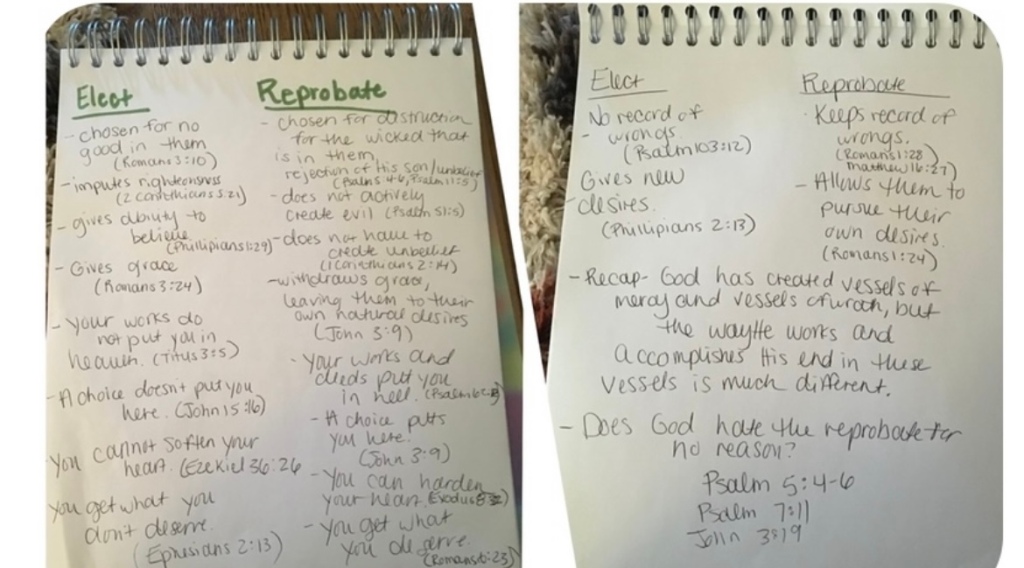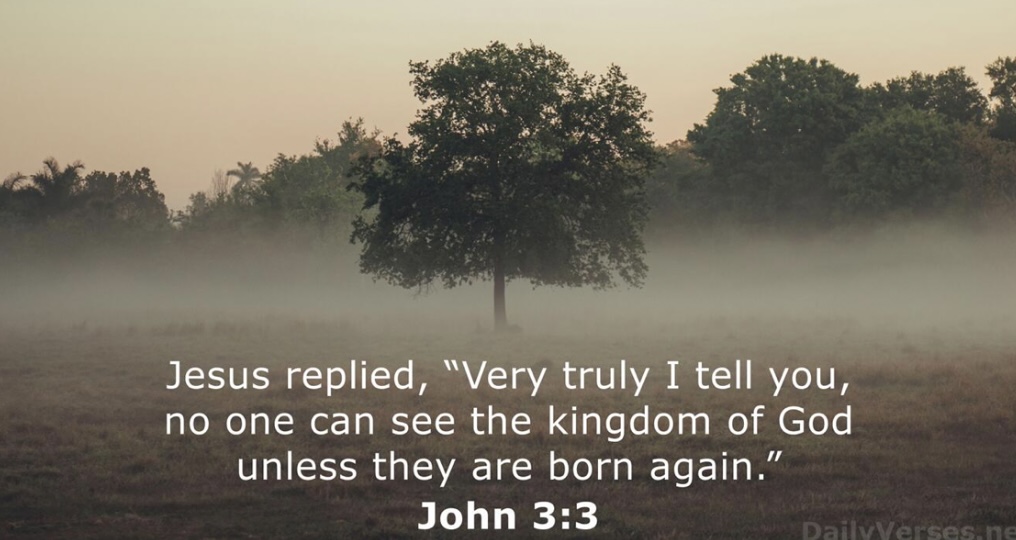
This is probably one of the most misunderstood doctrines of all time. Most Arminians (and even some Calvinists) have no clue about the difference between the two. If you bring up the topic about God’s sovereignty over salvation they’ll exclaim “You mean to tell me that God chooses some people for hell?” The correct statement would actually be that all people chose hell and their sin over God and it’s by His mercy and grace that He chose any for heaven. It is frustrating that they always attempt to make that point first instead of saying “You mean God chose some people for heaven?!” That’s something truly to be in awe of.
I’ve studied this doctrine for years in order to be able to explain this to those around me who have no clue as to what the Scripture teaches. For some reason I’m just now taking the time to put this into writing. So let’s take a minute and look at the definitions of the two and break down the differences. It’s important to discern the differences because one of these will put you in the hyper Calvinist camp (heresy) and the other will just put you in the camp with the majority of the reformed folks.
In doing some research I came across this article from John Piper. It was so spot on that I’m going to share an excerpt here to help you understand that the Bible teaches that God plans the destiny of each person, whether for judgement or salvation.
“Now, the term double predestination is used to refer to the fact that if God destines some for salvation and adoption, then he passes over others, so that their destiny is judgment and not salvation. Now, some people think we should not call this passing over a second predestination, since the Bible does not speak of it that way. And I would agree that we at least shouldn’t make a focus out of what the Bible does not make a focus.
But in fact, while not using the word predestined for unbelievers who perish, the Bible does refer to the reality of it. And it’s not just a logical deduction. Sometimes this gets a bad rap because they say, “There you go applying your crusty, wooden, cold logic, which the Bible doesn’t do.” Well, forget that. We’re not talking about a logical deduction here — we’re talking about texts.
For example, consider these three texts. First Peter 2:8, the one that was mentioned, refers to those who “stumble because they disobey the word, as they were destined to do.” Romans 9:22 refers to those whom God “endured with much patience” — namely, “vessels of wrath prepared for destruction.” Proverbs 16:4 says, “The Lord has made everything for its purpose, even the wicked for the day of trouble.”
Now, each of those texts needs careful attention and true interpretation. But my effort over the years has yielded the fact that I think they do in fact teach that God plans the destiny of each person, whether judgment or salvation. And that, of course, is very controversial. But it’s also very important.I mean, think of it. It’s not marginal. Think of what it says about the sovereignty of God either way, or about the nature of saving grace and its power — its sovereign effectiveness. Think about the implications for prayer and evangelism and assurance and so many other things. This is not a marginal issue, as though you could just shunt that aside and say, “We’ll just talk about other things.”
So ask yourself this question- Does God determine the destiny of man? Or does man determine his own destiny? If you say yes to the first question, then technically you believe in double predestination. If you said yes to the second, you’re at odds with Scripture. So let’s look some more into this and at the definition of equal ultimacy.
Equal ultimacy- is used of the view that the two decrees are symmetrical, in other words, God works equally to keep the elect in heaven and the reprobate out of heaven. Or to put it another way- Equal ultimacy is the position that God is equally active in causing the salvation of the elect as He is involved in causing the damnation of the reprobate. The problem with equal ultimacy is that the two decrees are not symmetrical. There is an example that has been used before of sun baking bricks to under how God deals with reprobates such as Pharaoh. Just as the sun takes all the moisture out of the brick leaving it hard, so God withdrew His graces from Pharaoh. leaving him hard. It was not a hardening where God infused some kind of stubbornness or hatred for the Israelites into Pharaoh. Pharaoh was born with a predisposition to hate Israel. All God had to do was to remove His grace and Pharaoh’s heart went his own way. This was not an infusion, but a withdrawing. For the regenerate person on the other hand, Christ righteousness has to be imputed to us. Evil does not have to be put in us, it’s already there. That is why the two are not symmetrical. God’s dealings with the elect are not symmetrical to the way He deals with the reprobate.
Now let’s look closer at double predestination and its meaning. First let me point out that this term has been wrongly used as a synonym for a symmetrical view of predestination (equal ultimacy) which sees election and reprobation being worked out in a parallel mode of divine operation. “The much greater issue of “double” predestination is the issue over the relationship between election and reprobation with respect to the nature of the decrees and the nature of the divine outworking of the decrees. If “double” predestination means a symmetrical view of predestination, then we must reject the notion.”
Classic definition of Double predestination -the idea that not only does God choose some to be saved, he also creates some people who will be damned.[10]
Some modern Calvinists respond to the ethical dilemma of double predestination by explaining that God’s active predestination is only for the elect. God provides grace to the elect causing salvation, but for the damned God withholds salvific grace. Calvinists teach that God remains just and fair in creating persons he predestines to damnation because although God unilaterally works in the elect producing regeneration, God does not actively force the damned to sin.[11] Double predestination may not be the view of any of the Reformed confessions, which speak of God passing over rather than actively reprobating the damned.[citation needed]However, John Calvin rejected such a position, stating: “This they do ignorantly and childishly since there could be no election without its opposite reprobation … whom God passes by he reprobates, and that for no other cause but because he is pleased to exclude them from the inheritance which he predestines to his children.”[12]
Even if you hold to the idea that God is passive and passes over some regarding the reprobate and that mankind fitted himself for destruction, you still have to acknowledge that God determines the outcome of their destiny leading you to hold to double predestination. One commentary that leans on God’s passivity regarding the reprobate on Romans 9:22 states God’s passing over like this-“What if God, choosing to show his wrath and make his power known, bore with great patience the objects of his wrath—prepared for destruction?” Many people think this verse teaches that God has made certain vessels for His wrath. But this is not the point of the verse. Reading above, mankind has already experienced God’s wrath. Mankind has fitted himself for destruction. It is God who endures these vessels—vessels who have prepared themselves for destruction because they would not leave their sin and turn to God.” We must be careful to not malign God’s character when we examine these two decrees, whether you hold to God being active or passive regarding the reprobate. We must recognize God’s sovereignty either way. R.C. Sproul helps us understand this clearly-
“The distortion of double predestination looks like this: There is a symmetry that exists between election and reprobation. God works in the same way and same manner with respect to the elect and to the reprobate. That is to say, from all eternity God decreed some to election and by divine initiative works faith in their hearts and brings them actively to salvation. By the same token, from all eternity God decrees some to sin and damnation (destinare ad peccatum) and actively intervenes to work sin in their lives, bringing them to damnation by divine initiative. In the case of the elect, regeneration is the monergistic work of God. In the case of the reprobate, sin and degeneration are the monergistic work of God. Stated another way, we can establish a parallelism of foreordination and predestination by means of a positivesymmetry. We can call this a _positive-positiv_e view of predestination. This is, God positivelyand actively intervenes in the lives of the elect to bring them to salvation. In the same way God positively and actively intervenes in the life of the reprobate to bring him to sin.
This distortion of positive-positive predestination clearly makes God the author of sin who punishes a person for doing what God monergistically and irresistibly coerces man to do. Such a view is indeed a monstrous assault on the integrity of God. This is not the Reformed view of predestination, but a gross and inexcusable caricature of the doctrine. Such a view may be identified with what is often loosely described as hyper-Calvinism and involves a radical form of supralapsarianism. Such a view of predestination has been virtually universally and monolithically rejected by Reformed thinkers.”
I hope you’re able to see the difference in the two decrees and how they are often confused. And I hope you were able to come to the conclusion that double predestination is not heretical but it’s actually biblical when you use the correct definition. God has created vessels of wrath and vessels of mercy, but the way He works and accomplishes His ends in these vessels is much different. Here’s Sproul’s final thoughts- “In sharp contrast to the caricature of double predestination seen in the positive-positive schema is the classic position of Reformed theology on predestination. In this view predestination is double in that it involves both election and reprobation but is not symmetrical with respect to the mode of divine activity. A strict parallelism of operation is denied. Rather we view predestination in terms of a positive-negative relationship.”
I’ll leave you with a picture of a little chart I did years ago detailing how the two decrees are not symmetrical.































